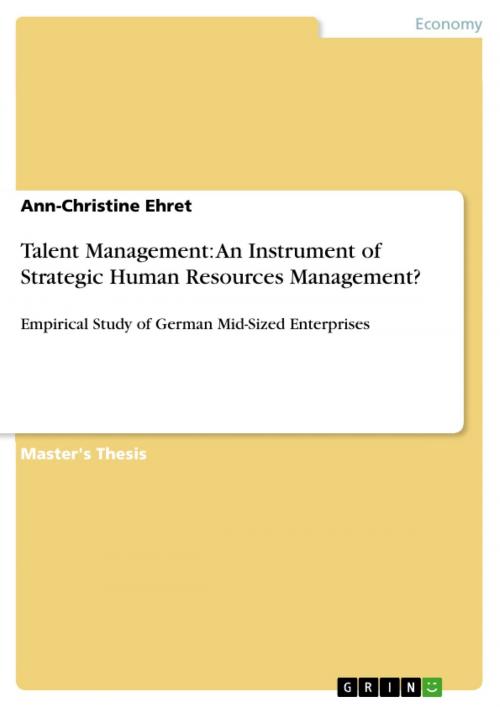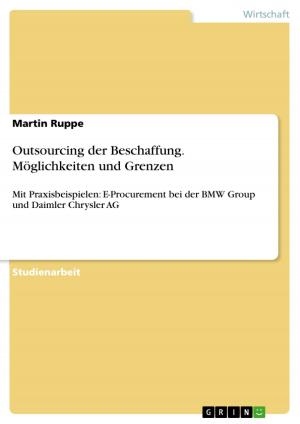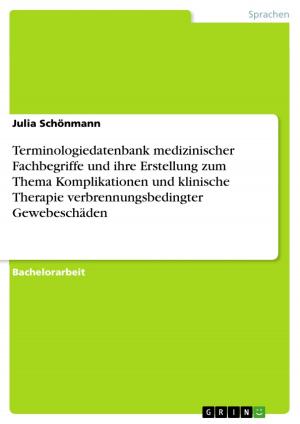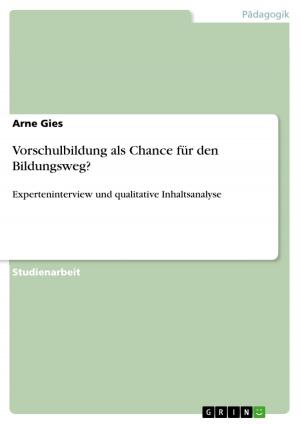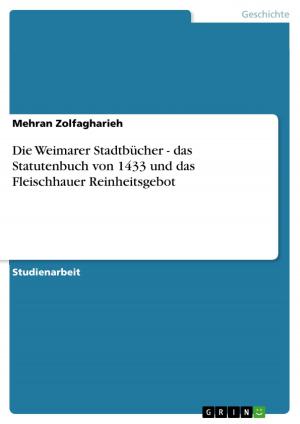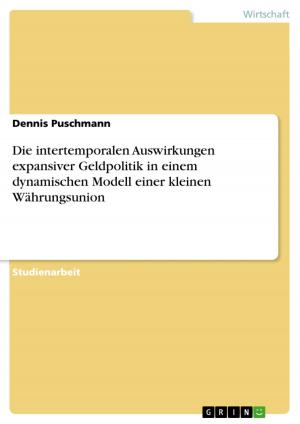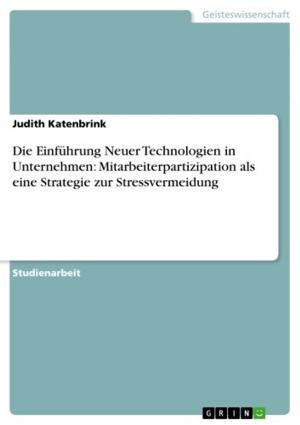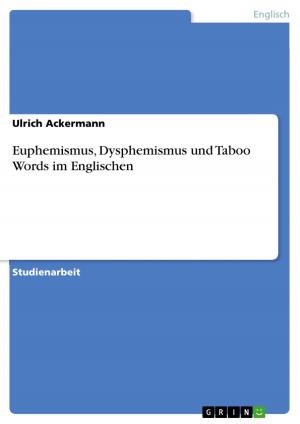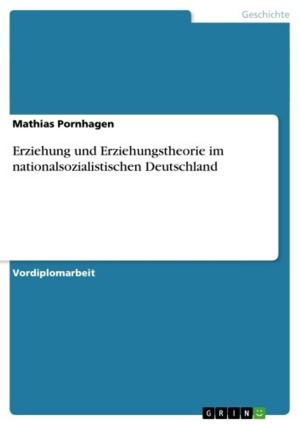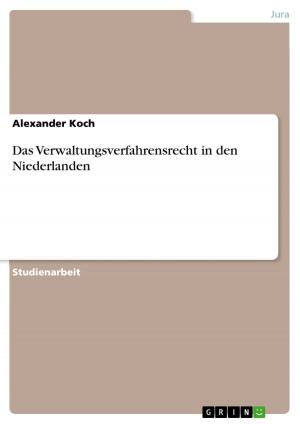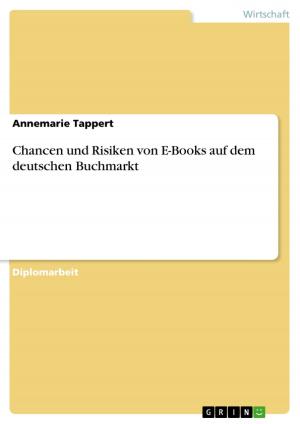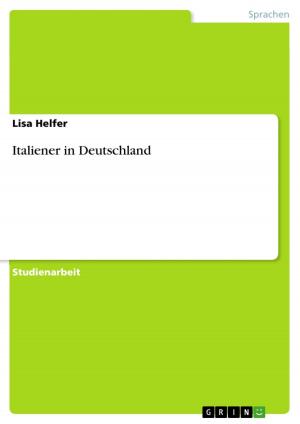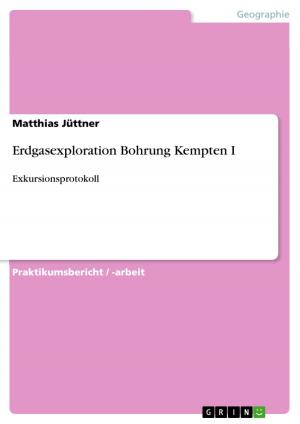Talent Management: An Instrument of Strategic Human Resources Management?
Empirical Study of German Mid-Sized Enterprises
Business & Finance, Human Resources & Personnel Management| Author: | Ann-Christine Ehret | ISBN: | 9783668088559 |
| Publisher: | GRIN Verlag | Publication: | November 17, 2015 |
| Imprint: | GRIN Verlag | Language: | English |
| Author: | Ann-Christine Ehret |
| ISBN: | 9783668088559 |
| Publisher: | GRIN Verlag |
| Publication: | November 17, 2015 |
| Imprint: | GRIN Verlag |
| Language: | English |
Master's Thesis from the year 2014 in the subject Business economics - Personnel and Organisation, University of Plymouth, language: English, abstract: This study provides an investigation on Talent Management in German mid-sized enterprises. The purpose of this research is to explore whether Talent Management is an instrument usable to overcome external challenges, such as demographic changes as well as a shortage in skilled labour, to enhance organisational performance and to remain competitive. The research determines that, Talent Management can be seen as a part of strategic Human Resources Management and in this context, as a high performance working system in order to develop, motivate and empower talented employees. Since empirical data in the national context of Germany are restricted on the one hand and, on the other hand, research efforts regarding Talent Management in small and medium-sized enterprises are of less significance, qualitative research methods were used in order to gather deeper insights. Three in-depth expert interviews were conducted, providing valuable information regarding the conceptualisation and operationalisation of Talent Management in the context of German mid-sized enterprises. The findings reveal that, what is of strong importance within small and medium sized enterprises in general is the expansion of the term talent to all employees and their skills and abilities instead of seeking for high potentials and so-called A-players. Furthermore, three significant characteristics of German companies; being long-term and developmentally orientated, as well as providing dual vocational training to potential future employees, have been identified. These qualities underlie the highly specialised industries in which German medium sized enterprises operate, skilled labour and development of these is of high importance. Overall, the dissertation concludes that Talent Management is recognised and implemented as an instrument of strategic human resources management within German medium sized enterprises. Special focus is put on investment in the Human Capital as the development and retention of potential is of strong importance. However, due to limited financial budgets and less recognition of line managers, Talent Management stands in its infancy. The research recommends further studies in order to investigate the findings and limitations of this dissertation, such as the empirically undetected field of Talent Management as a high performing system in national context or within small-and medium sized enterprises.
Master's Thesis from the year 2014 in the subject Business economics - Personnel and Organisation, University of Plymouth, language: English, abstract: This study provides an investigation on Talent Management in German mid-sized enterprises. The purpose of this research is to explore whether Talent Management is an instrument usable to overcome external challenges, such as demographic changes as well as a shortage in skilled labour, to enhance organisational performance and to remain competitive. The research determines that, Talent Management can be seen as a part of strategic Human Resources Management and in this context, as a high performance working system in order to develop, motivate and empower talented employees. Since empirical data in the national context of Germany are restricted on the one hand and, on the other hand, research efforts regarding Talent Management in small and medium-sized enterprises are of less significance, qualitative research methods were used in order to gather deeper insights. Three in-depth expert interviews were conducted, providing valuable information regarding the conceptualisation and operationalisation of Talent Management in the context of German mid-sized enterprises. The findings reveal that, what is of strong importance within small and medium sized enterprises in general is the expansion of the term talent to all employees and their skills and abilities instead of seeking for high potentials and so-called A-players. Furthermore, three significant characteristics of German companies; being long-term and developmentally orientated, as well as providing dual vocational training to potential future employees, have been identified. These qualities underlie the highly specialised industries in which German medium sized enterprises operate, skilled labour and development of these is of high importance. Overall, the dissertation concludes that Talent Management is recognised and implemented as an instrument of strategic human resources management within German medium sized enterprises. Special focus is put on investment in the Human Capital as the development and retention of potential is of strong importance. However, due to limited financial budgets and less recognition of line managers, Talent Management stands in its infancy. The research recommends further studies in order to investigate the findings and limitations of this dissertation, such as the empirically undetected field of Talent Management as a high performing system in national context or within small-and medium sized enterprises.
